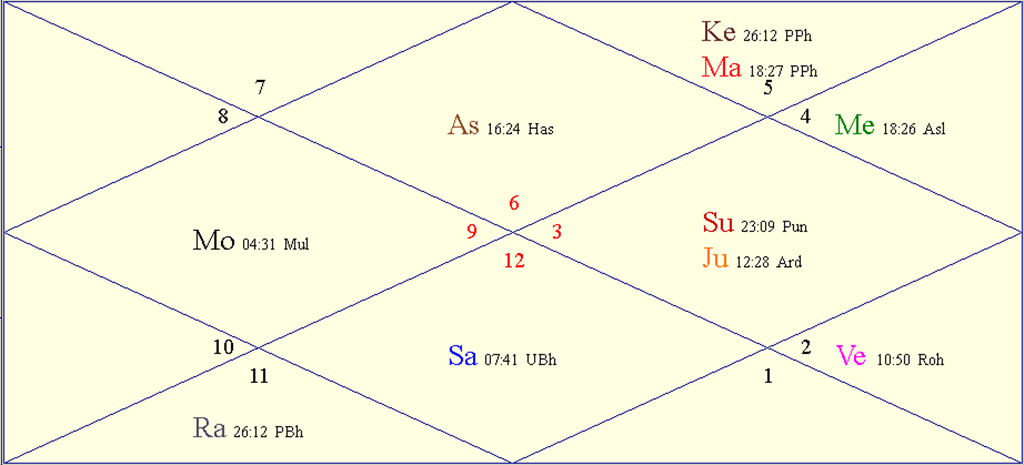
Planets power a chart, as they influence the houses of a chart in their own characteristic ways. Planet also means, ‘Wanderer’, which is true of their nature, as they move in their own orbits through space. A planet is a celestial body that follows a solar orbit, but in astrology planets represent astrological characteristics and influences that cannot be attributed to actual physical planets, as they exist in our solar system.
There are nine planets in Vedic astrology, known as the 'Navgrah' and they are divided into two groups, while Uranus, Neptune and Pluto are essentially used in Western astrology calculations. The planets in these two groups have a close affinity, that is they are considered to be friendly towards one another, but are opposed to (enemies of) the planets of the opposing group. These two groups are given below, the planets in these respective groups share common characteristics:
The more rational amongst us will question how these celestial bodies can have an influence on our lives. After all, planets that are made of rock and gases and in certain cases have noxious clouds of sulphuric acid and oceans of ammonia. It defies conventional logic. However, according to Hindu mythology, every object of significance has a spirit. This includes the planets, nature, the earth, creatures, rivers and oceans and so on. Certain highly evolved beings gained the blessings of the Gods through their deeds and spiritual awakening and were conferred as the deities of each planet. These deities became the guiding forces of the spirit of each planet. The planets symbolise these deities and have the characteristics of their respective deity.
In astrology, the Sun and Moon are included as planets, although astronomically, they are not. ‘Rahu’ and ‘Ketu’ are planets that are exclusive to Vedic astrology, whereas Pluto, Neptune and Uranus are a part of Western astrology not included in traditional Vedic astrology calculations. The planets of both groups, with exception of Mercury and the Sun and to a lesser extent Saturn and Jupiter, are neutral or opposed to one another.
In Vedic astrology planets are assigned different qualities which determine their characteristics and hence their influences in a chart. However, the effects that a planet can have depends on it’s position in the chart in question, the houses that it rules over and influences and the influences of other planets in the chart. Some of the qualities associated with planets are:
Planetary Genders:
The following planets are of a male gender and have masculine characteristics:
- The Sun
- Mars
- Jupiter
- The Moon
- Venus
- 'Rahu'
- Saturn
- 'Ketu'
Castes of Planets:
Planets also follow the Hindu caste system. Jupiter and Venus are ‘Brahmins' or priestly, the Sun and Mars are 'Kshatriyas' or warriors, the Moon is 'Vaishya', or a trader, Mercury is a 'Vaisya', Saturn 'Shudra', or a lower caste and Rahu and Ketu are outcastes. According to another view Mercury is a 'Shudra', and Saturn an outcaste. There is yet another view according to which Mercury is of a mixed caste.
Planetary Natures:
Mercury, Jupiter and Venus are naturally benevolent. Similarly the waxing Moon is a benefic. The waning Moon and Mercury can be malefic. The Sun, Mars, Saturn, Rahu and Ketu are naturally malevolent.
Planetary Qualities:
The Sun, Moon and Jupiter are 'Satvika', or have pure characteristics, Mercury and Venus of 'Rajas' or have worldly, material or passionate characteristics and the remaining planets viz. Mars, Saturn, Rahu and Ketu are of a 'Tamasik', or dark, ignorant or carnal nature.
Seasons:
There are six seasons that correspond to the following planets:
- 'Vasant', (Spring) : Venus
- 'Grism' (Summer) : The Sun and Mars
- 'Varsha' (Rainy) : The Moon
- 'Sarad' (Autumn) : Mercury
- 'Hemanta' (Dewy) : Jupiter
- 'Sisira' (Winter) : Saturn
























